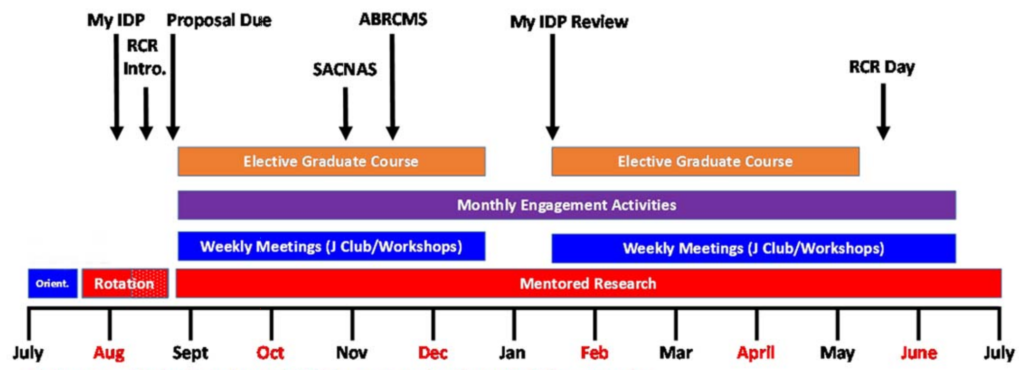Program Overview
The Vanderbilt Experimental Research Training Inclusion Community Engagement Skills (VERTICES) program is unique from other PREP programs around the country because of its focus on blending basic biomedical research with volunteerism and health disparities. VERTICES is an intensive mentoring program combined with broader professional engagement through academic research at Vanderbilt University. VERTICES provides an intellectually, socially and culturally rewarding experience to engage scholars at multiple levels throughout a 12 month training program. We leverage Vanderbilt University’s training expertise to cultivate academic knowledge and research skills and provide an integrated training program that supports resilience by fostering connections among program participants and their research mentors, peers, and respective communities. We are fortunate in that we have an extraordinary group of individuals through the Vanderbilt IMSD program who can serve as near-peer mentors.
Research and Mentor Selection:
From early in the application process, interested applicants will have access to the list of program mentors and a brief description of the research area that includes the techniques used, model systems studied, and the questions of interest to the research group. A primary focus of the program will be on introducing the Scholars to the principles and conduct of implementation of basic science research in a program mentor’s laboratory. This will be accomplished by ensuring that a majority of the time in the program is spent with the Scholar engaged in a laboratory-based, mentored research project. Therefore, the selection of an appropriate mentor who is both addressing an area of common interest for the mentor and the Scholar and one with whom the Scholar feels that they can establish a productive and sustainable mentoring relationship is a critical step in assuring the success of the Scholar. Within the first two weeks after orientation, Scholars will meet with the potential mentors they have identified to gather current, detailed information on the background and status of the research problem, assess the suitability of the laboratory environment, and discuss specific projects that would be available to the Scholar. Finally, VERTICES Scholars will have the opportunity to attend either the ABRCMS or SACNAS meeting the fall after they enter the program to present their research.
Coursework:

Our major focus is for Scholars to be in the lab. 75% of the Scholar’s time is spent in mentored research activity, 10% is devoted to the classroom, and 15% is spent in attending journal clubs, seminars, workshops, and individualized professional development activities. These outside of the laboratory activities are not diversions. They are intentional activities that provide the Scholars with the skills, habits, network, and knowledge to build successful careers in discovery.
Coursework for Credit: Scholars will enroll in 1 graduate-level course during the program. This may be in the fall or spring semester. A wide range of 36 courses have been selected as possible options for Scholars, ranging in topic from Neuroscience to Chemistry, and Biological Science, and are available from across Ph.D. programs in the School of Medicine and College of Arts & Sciences. Scholars will also participate in significant Rigor and Reproducibility (R&R) training
VERTICES Journal Club: This hour long, twice a month activity will be developed as Scholar-led discussions of articles selected by program leadership. Although Scholars may participate in journal clubs in their host laboratories and even associated Ph.D. training programs, presentations to peers in a supportive and controlled environment is designed to reduce anxiety while building confidence and skills.
VERTICES Professionalism Workshops: Many of our Scholars will have had significant research experience in the past, yet research experience alone is not enough to ensure success in graduate school. A key goal of our program is to help our students establish their personal identity as a scientist and develop a level of professionalism that will support their career goals. To this end, we will offer a variety of experiences to foster communication skills, team work skills, conflict resolution, and mentoring; all with the goal of aiding in the development of self-efficacy.
VERTICES Research Seminar: A key compliment to performing an independent research project is to hear complete research stories from established scientists who can serve as both inspiration and role models. We will intentionally expose Scholars to speakers who can provide this component of their training experience by both leveraging existing resources and by providing a program-specific opportunity.
VERTICES Engagement Activity: We also have developed a unique, monthly learning session for the Scholars, each lasting between 1-1.5 hours. These activities will engage the Scholars in skill development and expand their knowledge of the impact of science on the quality of life, particularly with regard to disparities that affect UR communities. To take advantage of existing partnerships and resources, we will organize these activities around broad areas of investigation that impact areas that disproportionately affect UR communities such as cardiovascular science, neuroscience, and cancer biology. These sessions will leverage discovery scientists who can relate scientific discovery to community impact. Some sessions will leverage visits and presentations by scientists who have impacted these broad areas while others might include excerpts from online, webcasts, or meeting archives that address these issues. The purpose of these activities are to connect the activities of the Scholars with the needs of their communities. We will provide Scholars examples of how their science may impact their communities while providing our Scholars opportunities to share their science with lay audiences.